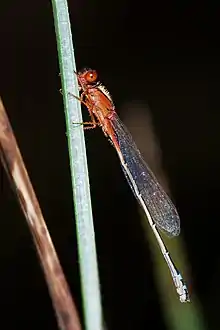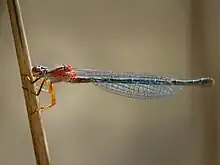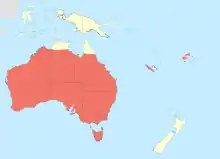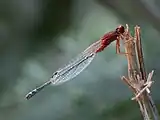| Red and blue damsel | |
|---|---|
 | |
| Male, Tasmania, Australia | |
 | |
| Female | |
| Scientific classification | |
| Domain: | Eukaryota |
| Kingdom: | Animalia |
| Phylum: | Arthropoda |
| Class: | Insecta |
| Order: | Odonata |
| Suborder: | Zygoptera |
| Family: | Coenagrionidae |
| Genus: | Xanthagrion Selys 1876[2] |
| Species: | X. erythroneurum |
| Binomial name | |
| Xanthagrion erythroneurum | |
 | |
The red and blue damsel (Xanthagrion erythroneurum) is a damselfly in the family Coenagrionidae.[5][1] It is the only member of the monotypic genus Xanthagrion.[6][7]
Description
The face and thorax are bright red.[8] The abdomen is pale in colour[8] and 2.2-2.4 cm long.[9] The female and male are similar in colour.[8]
Distribution and habitat
The red and blue damsel is widespread across all Australian states,[9] as well as Fiji, New Caledonia, and other islands in the Pacific.[10] It is found in north and eastern Tasmania. It is typically found near dams, marshes and slow watercourses.[9]
Gallery
.jpg.webp) Mating I. The male holds the female behind her head.
Mating I. The male holds the female behind her head..jpg.webp) Mating II. The male pushes the female under the water.
Mating II. The male pushes the female under the water..jpg.webp) Mating III. The female is completely under the water. Both male and female dragonflies go under.
Mating III. The female is completely under the water. Both male and female dragonflies go under. Male
Male.jpg.webp) Female wings
Female wings.jpg.webp) Male wings
Male wings
References
Wikimedia Commons has media related to Xanthagrion erythroneurum.
Wikispecies has information related to Xanthagrion erythroneurum.
- 1 2 Dow, R.A. (2017). "Xanthagrion erythroneurum". IUCN Red List of Threatened Species. 2017: e.T83152243A83381754. doi:10.2305/IUCN.UK.2017-1.RLTS.T83152243A83381754.en. Retrieved 20 November 2021.
- ↑ Selys-Longchamps, E. (1876). "Synopsis des Agrionines (suite du genre Agrion)". Bulletin de la Classe des Science, Académie Royale de Belgique (in French). 42: 490–531, 952–991 [520] – via Biodiversity Heritage Library.
- ↑ "Xanthagrion erythroneurum". ZipcodeZoo.com. July 17, 2009. Archived from the original on June 9, 2012. Retrieved 2009-07-25.
- ↑ Selys-Longchamps, E. (1876). "Synopsis des Agrionines (suite du genre Agrion)". Bulletin de la Classe des Science, Académie Royale de Belgique (in French). 42: 490–531, 952–991 [521] – via Biodiversity Heritage Library.
- ↑ "Species Xanthagrion erythroneurum (Selys, 1876)". Australian Faunal Directory. Australian Biological Resources Study. 2012. Retrieved 3 April 2017.
- ↑ "Genus Xanthagrion Selys, 1876". Australian Faunal Directory. Australian Biological Resources Study. 2012. Retrieved 3 April 2017.
- ↑ "Xanthagrion (Genus)". ZipcodeZoo.com. July 17, 2009. Archived from the original on June 9, 2012. Retrieved 2009-07-25.
- 1 2 3 "Red and Blue Damselfly - Xanthagrion erythroneurum". Brisbane Insects. Retrieved 2009-07-25.
- 1 2 3 Daley, Elizabeth (2007). Wings: An introduction to Tasmania's winged insects. Riffles Pty Ltd.
- ↑ Watson, J.A.L.; Theischinger, G.; Abbey, H.M. (1991). The Australian Dragonflies: A Guide to the Identification, Distributions and Habitats of Australian Odonata. Melbourne: CSIRO. ISBN 978-0643051362.
This article is issued from Wikipedia. The text is licensed under Creative Commons - Attribution - Sharealike. Additional terms may apply for the media files.
